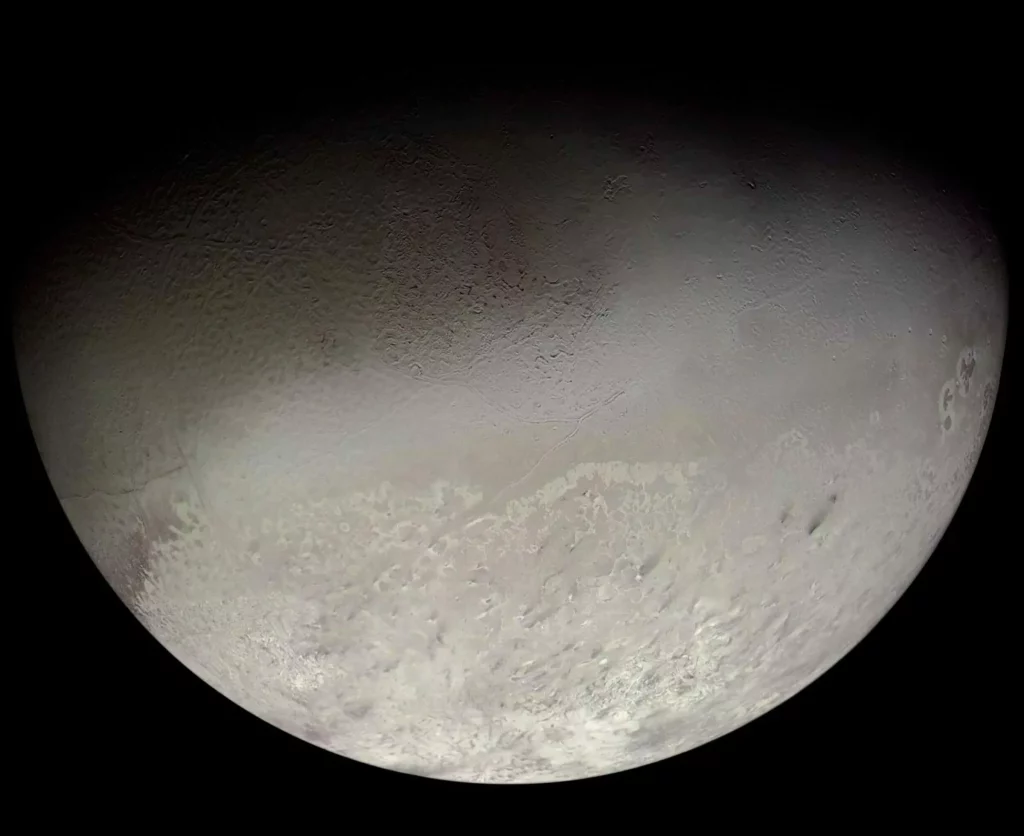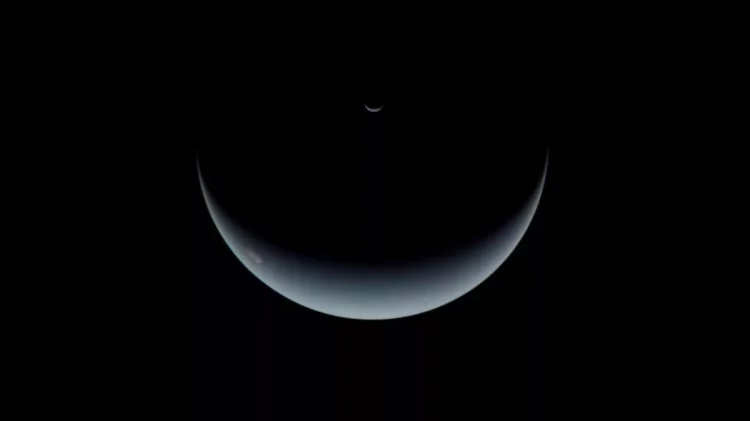Neptune, the eighth planet from the Sun, is a world of intense blue hues, extreme weather, and intriguing characteristics that set it apart from its planetary siblings. As the farthest planet in the Solar System, Neptune remains one of the most enigmatic and least explored worlds. This comprehensive article explores Neptune’s physical attributes, atmospheric dynamics, ring system, moons, exploration history, and its significance in planetary science.
I. Overview of Neptune
1. Basic Facts
- Size and Mass: Neptune is the third-largest planet in the Solar System by diameter, measuring about 49,244 kilometers (30,598 miles). It has a mass approximately 17.1 times that of Earth, making it slightly more massive than Uranus. Despite its large size, Neptune has a relatively low density compared to terrestrial planets.
- Orbit and Rotation: Neptune orbits the Sun at an average distance of about 4.5 billion kilometers (2.8 billion miles), or approximately 30.1 astronomical units (AU). It takes about 164.8 Earth years to complete one orbit around the Sun. Neptune’s rotational period is approximately 16 hours and 6 minutes.
- Axial Tilt: Neptune has an axial tilt of about 28 degrees, which is relatively moderate compared to other gas giants. This tilt results in seasonal variations, though they are less extreme than those experienced on Uranus.
2. Appearance
- Color and Atmosphere: Neptune is known for its striking blue color, which is due to the presence of methane in its atmosphere. Methane absorbs red light and reflects blue and green light, giving Neptune its vivid blue hue.
- Cloud Bands: Neptune’s atmosphere features several distinct cloud bands, which are more pronounced than those on Uranus. These bands are created by the planet’s strong winds and internal heat. The atmosphere also displays dark spots, which are large storm systems.
II. Atmospheric Composition and Dynamics
1. Composition and Structure
- Atmospheric Layers: Neptune’s atmosphere is primarily composed of hydrogen (about 80%) and helium (about 19%), with trace amounts of methane (around 1.5%). The atmosphere is divided into several layers, including the troposphere, stratosphere, and thermosphere.
- Temperature: Neptune has a relatively cold upper atmosphere, with temperatures around -214 degrees Celsius (-353 degrees Fahrenheit). The planet emits more heat than it receives from the Sun, which is attributed to its internal heat sources.
2. Weather and Climate
- Wind Patterns: Neptune is known for its extremely fast winds, which are among the highest in the Solar System. Wind speeds in Neptune’s upper atmosphere can reach up to 2,100 kilometers per hour (1,300 miles per hour). These winds contribute to the planet’s distinctive cloud patterns and storm systems.
- Storms and Cloud Features: Neptune’s atmosphere is marked by several notable storm systems, including the Great Dark Spot and smaller dark spots. These storm systems are similar to those found on Jupiter and Saturn and are driven by the planet’s strong winds and internal heat.
III. Ring System
1. Discovery and Structure
- Discovery: Neptune’s ring system was first observed in 1984 by the Voyager 2 spacecraft. The rings were detected as the spacecraft passed by the planet, revealing a faint and complex system of rings.
- Ring Composition: Neptune’s rings are composed primarily of dark, icy particles. They are less reflective than the rings of Saturn and are thought to contain water ice mixed with other materials. The rings are also characterized by their faint and narrow appearance.
- Ring Structure: Neptune has five known rings, which are named Adams, Le Verrier, Lassell, Arago, and Galle. The rings vary in brightness and density and are composed of both narrow and wider segments. Some of the rings are dotted with clumps of particles, which create bright, arc-like features.
2. Dynamics and Formation
- Ring Dynamics: The rings are influenced by the gravitational forces of Neptune’s moons, which help to maintain their structure and create gaps and divisions. The interactions between the rings and the moons are crucial for understanding the dynamics of the ring system.
- Formation Theories: The origin of Neptune’s rings is still a subject of research. They may have formed from the remnants of a shattered moon or captured debris from the planet’s formation. The rings could also be remnants of material that never coalesced into a moon.

IV. Moons of Neptune
1. Major Moons
- Triton: Triton is Neptune’s largest moon and is one of the most interesting moons in the Solar System. It is unique due to its retrograde orbit, meaning it orbits Neptune in the opposite direction of the planet’s rotation. Triton has a thin atmosphere composed mainly of nitrogen, with traces of methane. Its surface features large geysers that eject nitrogen gas and dark particles, contributing to its icy and rugged appearance.
- Proteus: Proteus is one of Neptune’s largest irregular moons and is heavily cratered. It has a dark surface and is thought to be composed primarily of water ice and rock. Proteus is the largest of Neptune’s inner moons and has a relatively irregular shape.
- Nereid: Nereid is an irregularly shaped moon with a highly eccentric orbit. It has a relatively low density and is thought to be composed of a mixture of ice and rock. Nereid’s orbit is highly elliptical, which contributes to its variable distance from Neptune.
- Halimede: Halimede is one of Neptune’s outer irregular moons and has an eccentric, inclined orbit. It is thought to be a captured object and is composed mainly of ice and rock.
- Naiad: Naiad is one of Neptune’s inner moons and is characterized by its small size and irregular shape. It orbits Neptune within the planet’s ring system and is heavily cratered.
2. Smaller Moons and Moonlets
- Despina: Despina is a small, irregularly shaped moon that orbits Neptune within its ring system. It is composed primarily of ice and rock and has a heavily cratered surface.
- S/2004 N 1: This is a small, recently discovered moonlet with an irregular orbit. It is one of Neptune’s smallest known moons and has a relatively low density.
V. Exploration History
1. Voyager 2 Mission
- Flyby and Discoveries: Neptune was visited by the Voyager 2 spacecraft in 1989, which provided the first close-up images and data of the planet, its rings, and its moons. The spacecraft’s observations revealed Neptune’s striking blue color, its ring system, and the unique features of its moons.
- Scientific Instruments: Voyager 2 carried a suite of scientific instruments, including the imaging science system, the ultraviolet spectrometer, and the magnetometer. These instruments provided valuable data on Neptune’s atmosphere, ring system, and magnetic field.
2. Future Missions
- Proposed Missions: Various proposals have been made for future missions to Neptune, including orbiters and landers. These missions would aim to study the planet’s atmosphere, ring system, and moons in greater detail.
- International Collaboration: Future exploration of Neptune may involve international collaboration, combining resources and expertise from multiple space agencies to conduct comprehensive studies of the planet and its environment.
VI. Scientific Significance
1. Understanding Ice Giants
- Comparison with Uranus: Studying Neptune provides insights into the properties and dynamics of ice giants, a class of planets that includes both Neptune and Uranus. Comparing these two planets helps scientists understand their similarities and differences, including their atmospheres, magnetic fields, and ring systems.
- Formation and Evolution: Research on Neptune contributes to our understanding of the formation and evolution of ice giants. Studying the planet’s composition, atmosphere, and ring system helps scientists learn more about the processes that shaped these distant worlds.
2. Atmospheric and Climate Studies
- Atmospheric Dynamics: Neptune’s extreme winds and storm systems offer a different perspective on atmospheric dynamics compared to other gas giants. Studying the planet’s weather patterns, wind speeds, and cloud features helps scientists understand the range of atmospheric processes that occur in the Solar System.
- Seasonal Variations: Neptune experiences seasonal variations due to its axial tilt, though these variations are less extreme than those on Uranus. Understanding these variations provides insights into the effects of axial tilt on planetary climates.
3. Comparative Planetology
- Ring Systems: Neptune’s ring system, with its dark, narrow rings and complex structure, offers a contrast to the more prominent and reflective rings of Saturn. Studying Neptune’s rings helps scientists explore the diversity of ring systems in the Solar System.
- Moon Geology: The diverse geological features of Neptune’s moons, from Triton’s geysers to Proteus’s craters, provide valuable information on the processes shaping icy moons. Comparing these features with those of other moons helps scientists understand the geological evolution of celestial bodies.











































Discussion about this post